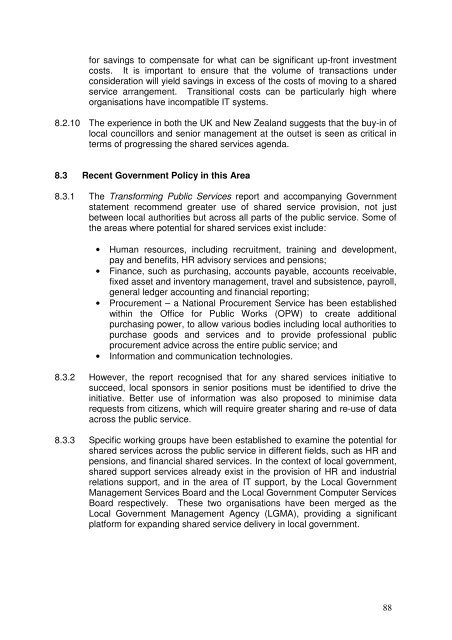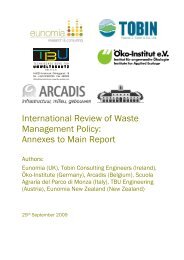Report of the Local Government Efficiency Review Group
Report of the Local Government Efficiency Review Group
Report of the Local Government Efficiency Review Group
Create successful ePaper yourself
Turn your PDF publications into a flip-book with our unique Google optimized e-Paper software.
for savings to compensate for what can be significant up-front investment<br />
costs. It is important to ensure that <strong>the</strong> volume <strong>of</strong> transactions under<br />
consideration will yield savings in excess <strong>of</strong> <strong>the</strong> costs <strong>of</strong> moving to a shared<br />
service arrangement. Transitional costs can be particularly high where<br />
organisations have incompatible IT systems.<br />
8.2.10 The experience in both <strong>the</strong> UK and New Zealand suggests that <strong>the</strong> buy-in <strong>of</strong><br />
local councillors and senior management at <strong>the</strong> outset is seen as critical in<br />
terms <strong>of</strong> progressing <strong>the</strong> shared services agenda.<br />
8.3 Recent <strong>Government</strong> Policy in this Area<br />
8.3.1 The Transforming Public Services report and accompanying <strong>Government</strong><br />
statement recommend greater use <strong>of</strong> shared service provision, not just<br />
between local authorities but across all parts <strong>of</strong> <strong>the</strong> public service. Some <strong>of</strong><br />
<strong>the</strong> areas where potential for shared services exist include:<br />
• Human resources, including recruitment, training and development,<br />
pay and benefits, HR advisory services and pensions;<br />
• Finance, such as purchasing, accounts payable, accounts receivable,<br />
fixed asset and inventory management, travel and subsistence, payroll,<br />
general ledger accounting and financial reporting;<br />
• Procurement – a National Procurement Service has been established<br />
within <strong>the</strong> Office for Public Works (OPW) to create additional<br />
purchasing power, to allow various bodies including local authorities to<br />
purchase goods and services and to provide pr<strong>of</strong>essional public<br />
procurement advice across <strong>the</strong> entire public service; and<br />
• Information and communication technologies.<br />
8.3.2 However, <strong>the</strong> report recognised that for any shared services initiative to<br />
succeed, local sponsors in senior positions must be identified to drive <strong>the</strong><br />
initiative. Better use <strong>of</strong> information was also proposed to minimise data<br />
requests from citizens, which will require greater sharing and re-use <strong>of</strong> data<br />
across <strong>the</strong> public service.<br />
8.3.3 Specific working groups have been established to examine <strong>the</strong> potential for<br />
shared services across <strong>the</strong> public service in different fields, such as HR and<br />
pensions, and financial shared services. In <strong>the</strong> context <strong>of</strong> local government,<br />
shared support services already exist in <strong>the</strong> provision <strong>of</strong> HR and industrial<br />
relations support, and in <strong>the</strong> area <strong>of</strong> IT support, by <strong>the</strong> <strong>Local</strong> <strong>Government</strong><br />
Management Services Board and <strong>the</strong> <strong>Local</strong> <strong>Government</strong> Computer Services<br />
Board respectively. These two organisations have been merged as <strong>the</strong><br />
<strong>Local</strong> <strong>Government</strong> Management Agency (LGMA), providing a significant<br />
platform for expanding shared service delivery in local government.<br />
88
















